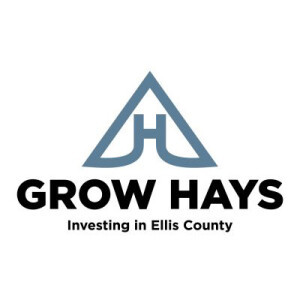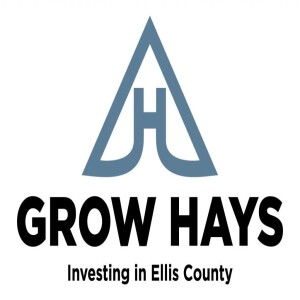Search : grow hays
Search : grow hays



Monday Dec 23, 2024
Post Podcast: Grow Hays Discusses Plans for Hays Micro Factory
Monday Dec 23, 2024
Monday Dec 23, 2024
On this episode of the Post Podcast, Hays Post Reporter Cristina Janney speaks with Grow Hays Executive Director Doug Williams about the Micro Factory.
Full Article Here



Monday Dec 09, 2024
Grow Hays year in review: Housing still key to growth
Monday Dec 09, 2024
Monday Dec 09, 2024
On this episode of the Post Podcast Hays Post reporter Cristina Janney recaps the year with Grow Hays executive director Doug Williams.
Read more on Hays Post.



Thursday Sep 19, 2024
Grow Hays director discusses property taxes
Thursday Sep 19, 2024
Thursday Sep 19, 2024
On this episode of the Post Podcast, Hays Post Reporter Cristina Janney speaks with Grow Hays Executive Director Doug Williams about property taxes.



Monday Sep 02, 2024
Grow Hays director discusses organization's mission
Monday Sep 02, 2024
Monday Sep 02, 2024
On this episode of the Post Podcast, Hays Post Reporter Cristina Janney speaks with Grow Hays Executive Director Doug Williams about the mission of Grow Hays in Ellis County.



Friday Aug 16, 2024
Friday Aug 16, 2024
On this episode of the Post Podcast, Hays Post Reporter Cristina Janney speaks with Grow Hays Executive Director Doug Williams about incentive districts as Hays city leaders are looking for expansion opportunities.
Read more at Hays Post.



Wednesday Aug 07, 2024
Grow Hays director discusses latest development north of I-70
Wednesday Aug 07, 2024
Wednesday Aug 07, 2024
On this episode of the Post Podcast, Hays Post Reporter Cristina Janney speaks with Grow Hays Executive Director Doug Williams about development north of I-70, near Home Depot.



Saturday Jul 20, 2024
Grow Hays director discusses incentive district for The Grove
Saturday Jul 20, 2024
Saturday Jul 20, 2024
On this episode of the Post Podcast, Hays Post Reporter Cristina Janney speaks with Grow Hays Executive Director Doug Williams about development projects in Hays.
Read more on Hays Post.



Thursday Jun 06, 2024
Grow Hays director discusses Hays development projects
Thursday Jun 06, 2024
Thursday Jun 06, 2024
On this episode of the Post Podcast, Hays Post Reporter Cristina Janney speaks with Grow Hays Executive Director Doug Williams about development projects in Hays.



Friday May 24, 2024
Grow Hays director discusses retail recruitment in Hays
Friday May 24, 2024
Friday May 24, 2024
On this episode of the Post Podcast, Hays Post Reporter Cristina Janney speaks with Grow Hays Executive Director Doug Williams about retail recruitment in Hays.



Sunday Apr 28, 2024
Grow Hays director discusses economic impact of new police station
Sunday Apr 28, 2024
Sunday Apr 28, 2024
On this episode of the Post Podcast, Hays Post Reporter Cristina Janney speaks with Grow Hays Executive Director Doug Williams about the economic impact of the recently announced plan to relocate the Hays Police Department into the current home of Astra Bank.
Read more on Hays Post.



Sunday Apr 21, 2024
Grow Hays director discusses FHSU's economic impact
Sunday Apr 21, 2024
Sunday Apr 21, 2024
On this episode of the Post Podcast Hays Post Reporter Cristina Janney speaks with Grow Hays Executive Director Doug Williams about the economic impact of Fort Hays State University.



Sunday Apr 14, 2024
Grow Hays director discusses benefits of Medicaid expansion
Sunday Apr 14, 2024
Sunday Apr 14, 2024
On this episode of the Post Podcast, Hays Post Reporter Cristina Janney speaks with Grow Hays Executive Director Doug Williams about the economic impact of Medicaid expansion in Ellis County.



Monday Apr 08, 2024
Grow Hays releases annual report
Monday Apr 08, 2024
Monday Apr 08, 2024
On this episode of the Post Podcast Hays Post Reporter Cristina Janney speaks with Grow Hays Executive Director Doug Williams about their annual report.



Sunday Jan 28, 2024
Grow Hays shares housing market updates
Sunday Jan 28, 2024
Sunday Jan 28, 2024
On this episode of the Post Podcast, Hays Post Editor Cristina Janney discusses the Ellis County housing market with Grow Hays Executive Director Doug Williams.



Saturday Jan 20, 2024
Grow Hays Microfactory offers business expansion opportunities
Saturday Jan 20, 2024
Saturday Jan 20, 2024
On this episode of the Post Podcast, Hays Post Reporter Cristina Janney speaks with Grow Hays Executive Director Doug Williams about the Microfactory project.



Friday Dec 15, 2023
Grow Hays director discusses Medicaid expansion
Friday Dec 15, 2023
Friday Dec 15, 2023
On this episode of the Post Podcast, Hays Post Reporter Cristina Janney speaks with Grow Hays Executive Director Doug Williams about the recent letter of support signed by the Hays City Commission to support Medicaid expansion.



Friday Nov 10, 2023
Grow Hays announces Ellis County Youth Entrepreneurship Challenge winners
Friday Nov 10, 2023
Friday Nov 10, 2023
On this episode of the Post Podcast, Hays Post Reporter Cristina Janney speaks with Grow Hays Executive Director Doug Williams about the latest Ellis County Youth Entrepreneurship Challenge.
Read more about the event on Hays Post.



Monday Oct 30, 2023
Grow Hays director explains Ellis County property tax levels
Monday Oct 30, 2023
Monday Oct 30, 2023
On this episode of the Post Podcast, Hays Post reporter Becky Kiser discusses Ellis County property taxes with Grow Hays Executive Director Doug Williams.



Sunday Oct 01, 2023
Grow Hays gives look into franchise systems
Sunday Oct 01, 2023
Sunday Oct 01, 2023
On this episode of the Post Podcast, Grow Hays executive director Doug Williams discusses franchise systems following their Trispectives presentation.



Sunday Sep 17, 2023
Grow Hays preps for the upcoming Icehouse Series, Quarterly Luncheon
Sunday Sep 17, 2023
Sunday Sep 17, 2023
On this episode of the Post Podcast, Grow Hays executive director Doug Williams discusses the upcoming Icehouse, Think Like an Entrepreneur series and Quarterly Luncheon.